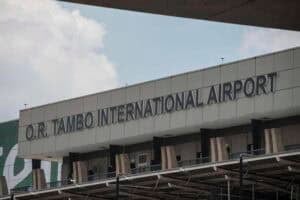Nobel Peace Prize winner Muhammad Yunus will lead a caretaker government that is being established by the military.

Three days after a student-led uprising forced their autocratic premier to flee by helicopter, euphoric Bangladeshis with hopes for change welcomed their new leader home.
Suleiman Islam Russell, 25, was among the crowd of hundreds who came to Dhaka’s international airport to greet Nobel Peace Prize winner Muhammad Yunus, who will lead a caretaker government that is being established by the military.
He had faith that the veteran economist was up to the job.
ALSO READ: Yunus urges Bangladeshis to ‘get ready to build the country’
“I believe that Professor Yunus will restore democracy in the country,” Russell said. “I believe he will rebuild our country.”
Ex-prime minister Sheikh Hasina, accused of widespread human rights abuses including the jailing of political opponents, fled to neighbouring India on Monday as masses of protesters flooded Dhaka’s streets.
The military then agreed to student demands that Yunus — who won the Nobel in 2006 for his pioneering microfinancing work — lead an interim government.
Yunus had travelled abroad this year while on bail after being sentenced to six months in jail on a labour charge condemned as politically motivated. A Dhaka court acquitted him on Wednesday.
Yunus was hit with more than 100 criminal charges during Hasina’s 15-year tenure, as well as a smear campaign by a state-led Islamic agency that accused him of promoting homosexuality.
– ‘Control corruption’ –
He faces mammoth challenges.
Among the demands of the crowds on the capital Dhaka’s bustling streets: a new government, imposing law and order, and stopping corruption.
More than 455 people were killed during weeks of clashes between protesters and security forces.
Security in Bangladesh has improved dramatically but there have been reports of revenge attacks on Hasina’s supporters and party officials, as well as on the Hindu minority.
But Azizur Rahman, a 29-year-old businessman, said he trusted the South Asian country would calm once the authorities were in control.
“The situation, which broke down over the unrest, is improving gradually,” Rahman said.
ALSO READ: India ‘deeply concerned’ at Bangladesh crisis – foreign minister
“Law and order will be fully restored once the newly formed government takes charge.”
Mohammed Younus, a 53-year-old street vendor, said he had opened his store for a second day running on Thursday as daily life returned to normal.
Younus hoped the new authorities would be able to check corruption and help slow the rising prices of daily commodities.
Bangladesh has been dominated for decades by an entrenched elite linked to security forces, broken only by periods of instability and military rule.
Yunus is seen as offering an alternative.
“I hope Yunus will be able to control corruption as he doesn’t have previous political legacy — and he is not a puppet,” the street vendor Younus said.
“I hope he will be able to take the government ahead, as he has connections globally.”
– ‘Breathe freely’ –
Change is already visible on the streets.
Police officers are expected back on the beat after they went on strike on Tuesday, when they said they feared for their safety over reprisal attacks for their role in the brutal crackdown on protesters before Hasina fell.
Student protesters have volunteered to keep the traffic moving in the interim, directing honking cars and streams of rickshaw taxis clogging the streets.
Shahidul Mia, a 23-year-old motorbike rider, said life was slowly returning to normal.
“I’m happy with the students controlling the traffic because they don’t harass and fine us like traffic police,” he said.
ALSO READ: Bangladesh’s prime minister resigns, forced to flee
The Bangladesh National Party (BNP), the main opposition party that was crushed under Hasina’s rule, held a mass rally in Dhaka on Wednesday.
“The country has been liberated, the dictator government has fallen,” said BNP supporter Mohammed Enayet.
“We couldn’t gather in the streets in the past days, we couldn’t breathe. That’s why I came here, to breathe freely.”
© Agence France-Presse






